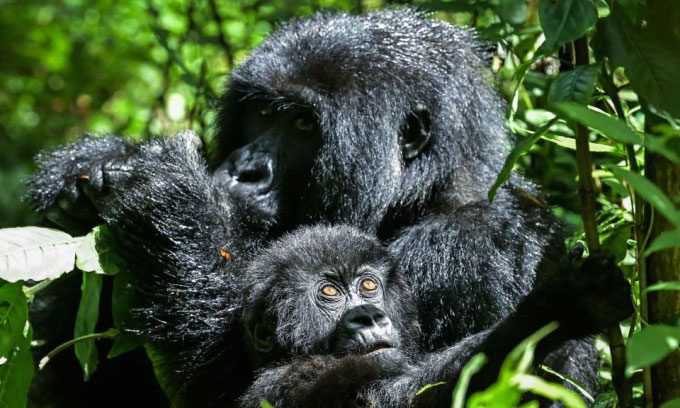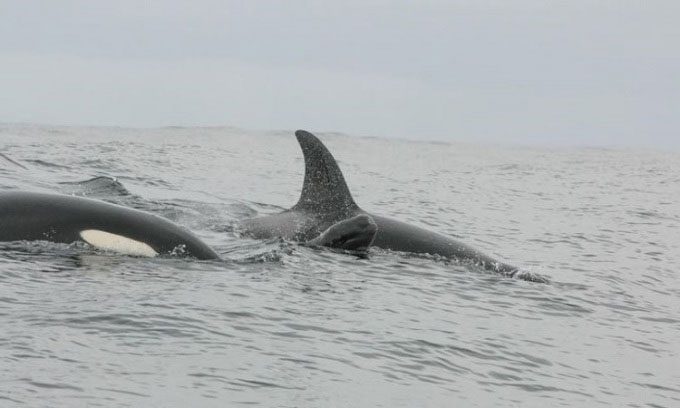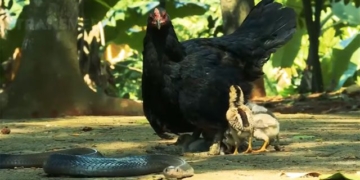The phenomenon of animals adopting young ones can provide evolutionary benefits, but it may also stem from other factors such as empathy or inexperience.
The act of caring for an orphaned newborn animal, which may not have any familial relationship, can offer an evolutionary advantage for the adoptive parents, according to Michael Weiss, a behavioral ecologist and research director at the Whale Research Center in Washington State. For instance, adopting can provide valuable experience for females that have not yet given birth, thereby increasing the survival chances of their future offspring. Adoption behavior can occur within the same species or across different species, although the latter is extremely rare.

Mountain gorillas (Gorilla beringei beringei) live in groups and adopt orphaned young. (Photo: SIMON MAINA/AFP).
In a study published in the journal eLife in 2021, a group of experts examined the impact of maternal loss on mountain gorillas (Gorilla beringei beringei) and found that orphaned individuals over two years old formed strong bonds with other group members, particularly with the dominant males.
Mountain gorillas live in groups, typically consisting of one dominant male, several females, and their young. Regardless of whether the dominant male is the father of the young, his role is to protect the next generation from being killed by rival males.
“Males that excel at caring for young and do so in front of females will be highly favored. Caring for an orphaned young can boost the dominant male’s status, increasing his mating opportunities and passing on his genes,” explained Robin Morrison, the study’s author in eLife and a behavioral ecologist at the University of Zurich.
Morrison noted that female mountain gorillas in the group do not necessarily benefit from raising orphaned young, but they also do not expend much effort as the young over two years old can forage for themselves. Moreover, the additional young companions can enhance their social skills.
Adoption is also common among other primate species and can help connect groups together. In a study published in the journal Scientific Reports in 2021, researchers recorded the first instance of a large ape species, specifically a female bonobo (Pan paniscus), adopting a young individual from another group. They suggested that this behavior could enhance the social status of adult bonobos.
Another possibility is that, like humans, female bonobos feel empathy and affection for newborns. However, this affection can lead to abductions and fatalities for the young if they are caught in a chaotic situation.
Primates can also exhibit caregiving instincts, similar to humans when they see a baby or small animal. This is not exclusively true for primates, according to Weiss, who has spent significant time studying killer whales (Orcinus orca) in the waters surrounding the Pacific Northwest and western Canada.

Young pilot whale swimming with a killer whale. (Photo: Icelandic Orcas).
In 2021, scientists in Iceland first documented a killer whale adopting a young pilot whale (Globicephala). In June 2023, a team from the Icelandic Killer Whale Project was also puzzled by another female displaying similar behavior.
Weiss stated that these cases are a “great mystery” as researchers have never observed adult individuals of these two species communicating with one another, meaning that killer whales may have abducted the young pilot whale.
A major question is what benefit this brings to the killer whales. Producing milk requires substantial energy, and killer whale mothers nurse their young for up to three years. By diverting attention and draining resources from the killer whale mother, the adopted young could also pose challenges to her own offspring.
The research team suggested that perhaps the female killer whale felt compelled to care for a small animal because she had just given birth herself. Other factors may contribute to the adoption behavior, such as curiosity, high sociability, or inexperience. Inexperience may explain why the killer whale showed interest in the pilot whale. “It could be a misplaced maternal instinct,” Weiss remarked.
In non-mammalian species, inexperienced mothers sometimes make mistakes. The common cuckoo (Cuculus canorus) is a parasitic bird that lays its eggs in the nests of other species to save the effort of caring for them. In a study published in the journal Behavioral Ecology in 1992, the authors found that younger females of the great reed warbler (Acrocephalus arundinaceus) were more easily deceived by cuckoo eggs than older females.




















































